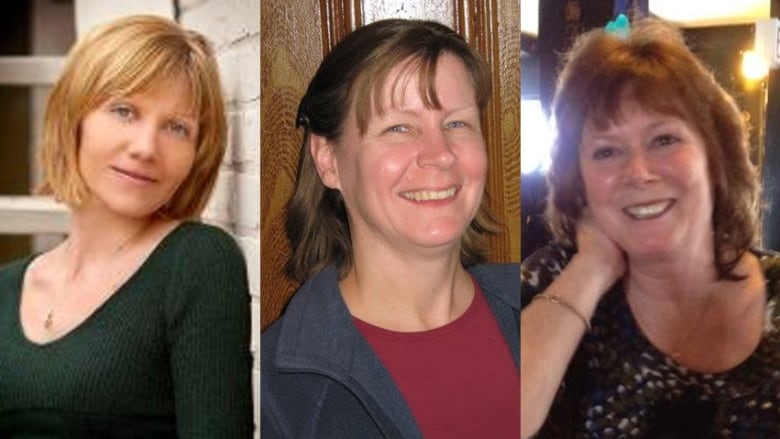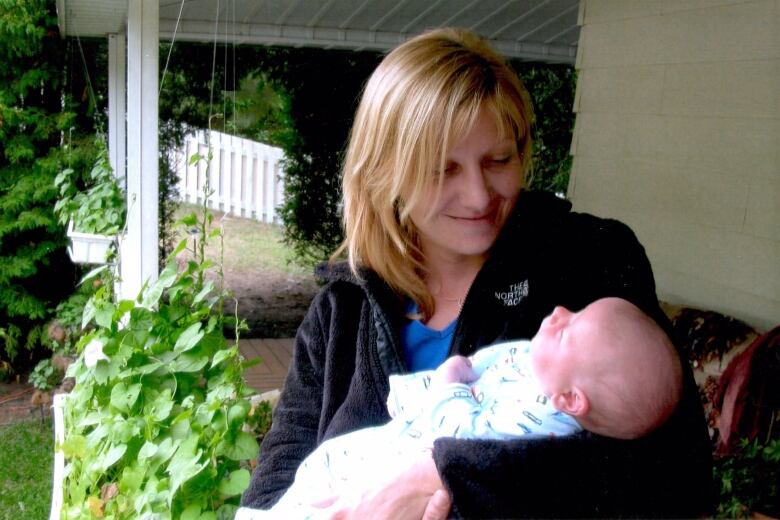Program for treating abusers scrutinized during Day 7 of triple-homicide inquest
Inquest focusing on challenges of dealing with domestic violence in rural areas

A provincialtreatmentprogram for perpetrators of intimate partner violence isunder scrutiny during an ongoing coroner's inquest examining issues stemming from the murders of three Ottawa Valley women killed by the same violent offender.
On Sept. 22, 2015, Carol Culleton, Anastasia Kuzyk and Nathalie Warmerdam were all murdered in Renfrew County by the same perpetrator who had a known history of violence against women.
Basil Borutski was convicted of three counts of murder in a jury trial and is in prison. Before the murders, he was convicted andjailed for acts of intimate partner violence against two of the victims and then released on probation conditions that he continually defied without reprimand.
Five inquest jurors hearing from experts and first-hand witnesses are being tasked with recommending changes to policies and protocols to better protect and support survivors of intimate partner violencein rural communities in thefuture.
The inquest has heard that hewas required by courtto attend the partner assault response (PAR) program but never did, offering probation officers a number of excuses.
Deborah Kasdorff, a former managerof Ontario's Victim/Witness Assistance program which guides victims through the court processsaid he likely would not have been a good candidate for PAR given he deflectedblame onto his victims.
"I know they haverefused to accept people into the program who were just trying to get themselves through" without meaningfully engaging in the program's 12 group sessions, Kasdorff said.
Kasdorff and a representative ofthe Ministry of the Attorney General's victim services programming, Jill Dubrick, were questioned at length about the program on Day 7 of the inquest on Tuesday.
Same program for all abusers
While the groupscontracted to carry out PARdo have "some flexibility" to tweak the focus of sessions,all referrals to the program no matter how severe or frequent their pastabuses go through the same nine-topic curriculum, Dubrick said.
She was expressing concern about being compelled to come to court. Deborah Kasdorff
"You don't differentiate between ... a 19-year-old [who]slaps hisgirlfriend at aparty where everyone's had too much to drink ... [and] someone who has 20 or 30 years and has done this numerous times," a male juror remarked.
"I certainly see your point aboutdifferent offenders, clients,having different needs," Dubrick said, adding that the province looks forward to receiving the juror's recommendations.
Another male juror as well as Warmerdam's daughter Valerie Warmerdam asked about how the province evaluates whether PAR is working.
Dubrick said research indicates PAR-like programs generally lead to changes in behaviour and reduce the chances of reoffending.But she saidthe province does not check "at the granular level" about the educational credentials of program staff.
"[If] somebody brings forward a concern to our attention through regular kind of an engagement with that agency,it comes to the attention of our ministry staff. We would take action on that," she said.
Victim said murderer needed treatment
Earlier on Tuesday, the inquest heard testimony fromKasdorffabout her different experiences dealing with Warmerdam and Kuzyk through theVictim/Witness Assistance program.
Borutskithreatened Warmerdam's son and brutally beat Kuzyk. He was convicted and served jail time for both crimes.
I never heard from her again. And I actually never heard from Nathalie again. Deborah Kasdorff
"Nathalie was very engaged in getting as much information as she could.Anastasia, I felt, was moving on,"Kasdorffsaid.
Kuzyk was worried about him being charged, Kasdorff said. A report submitted during the inquest sayshe threatened to kill a differentformer partner if she ever took action that might put him in jail.
"She felt that what was needed in this case was counselling and not charges or prosecution and she was expressing concern about being compelled to come to court,"Kasdorffsaid of Kuzyk.
"She felt what he needed was mental health help [and]help dealing with addictions."

Kuzyk didn't want to write a victim impact statement when he was convicted either, Kasdorff said.
"Do they really want the offender to know that they're afraid and can't sleep at night?That feels like you're giving that person back some more power," she said.
Kasdorffrecalled being "quite concerned" about Kuzykin the lead-up to his release inDecember 2014. She wanted to make sure Kuzykknew she could reach out for help.
When Kasdorff missed Kuzyk dropping off a Christmas ornament, she chased after Kuzyk, saw her driving awayand later left a voicemail again offering her assistance.
"I never heard from her again. And I actually never heard from Nathalie again."












_(720p).jpg)


 OFFICIAL HD MUSIC VIDEO.jpg)
.jpg)



























































































